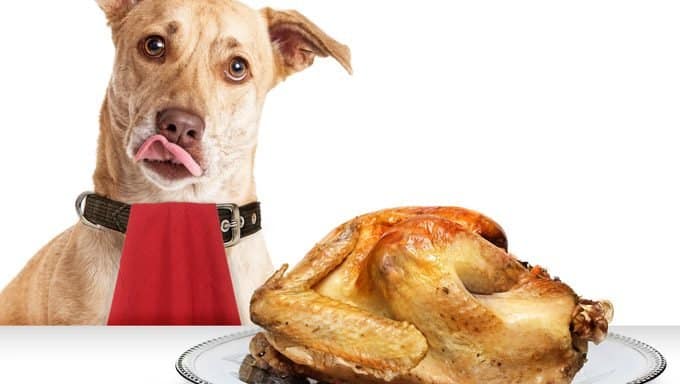Dogs are notorious for begging at the dinner table, but is it safe to give them scraps from our own meals?
The answer is that it depends…
While some human foods are perfectly safe for dogs to eat, others can be dangerous.
For instance, many dog owners are aware that they should not give their pets chocolate due to its potential toxicity.
Garlic and onions may be poisonous to your furry friend too.
Because some human food can cause harm to your dog, most pet parents choose the safe route and avoid feeding them anything but dog food.
But did you know some human foods are not only safe but can also have lots of nutritional benefits for your furry baby?
For instance, you can feed your dog some human foods to help them gain weight.
Human Foods That Can Help Your Dog Gain Weight
The following are some human foods that you can safely feed your dog for weight gain.
1. Beef
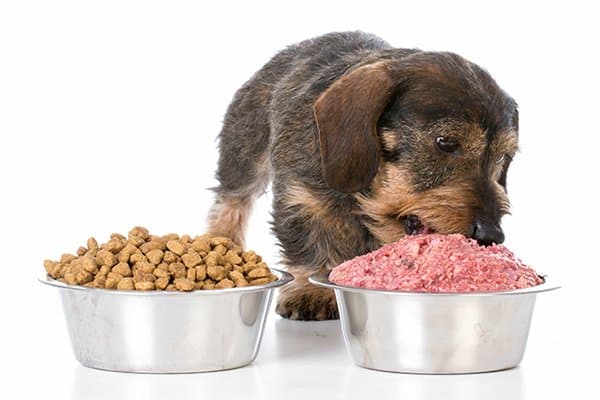
Lean cuts of beef, cooked without any seasoning, can be a tasty and protein-packed addition to your dog’s diet.
Dogs are carnivores and so their digestive systems are well-equipped to digest meat.
In fact, beef is one of the main ingredients used in making dog food.
The protein in beef will help your pup build muscle and gain weight.
Just be sure to avoid feeding your dog any beef that has sauces as that might be harmful to your dog.
You may also want to check: How Much Ground Beef Should I Feed My Dog?
2. Eggs
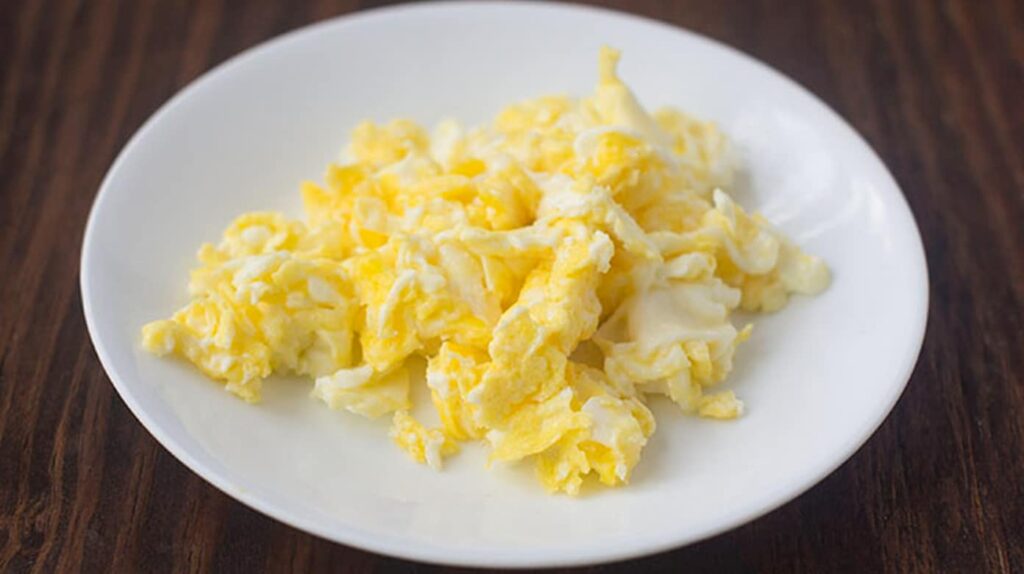
Similar to beef, eggs are an excellent source of protein for dogs.
They are rich in protein, fatty acids, and vitamins, making them a nutritious addition to your dog’s diet.
You can feed your dog cooked eggs, either scrambled or boiled.
Just make sure not to feed them raw eggs, as they may contain bacteria that can make your dog sick.
Additionally, ensure the eggs do not have shells in them as that can be a choking hazard.
Also, the AKC advises that you try to feed your dog eggs from free-range chicken because they are healthier and more nutritious.
3. Cheese
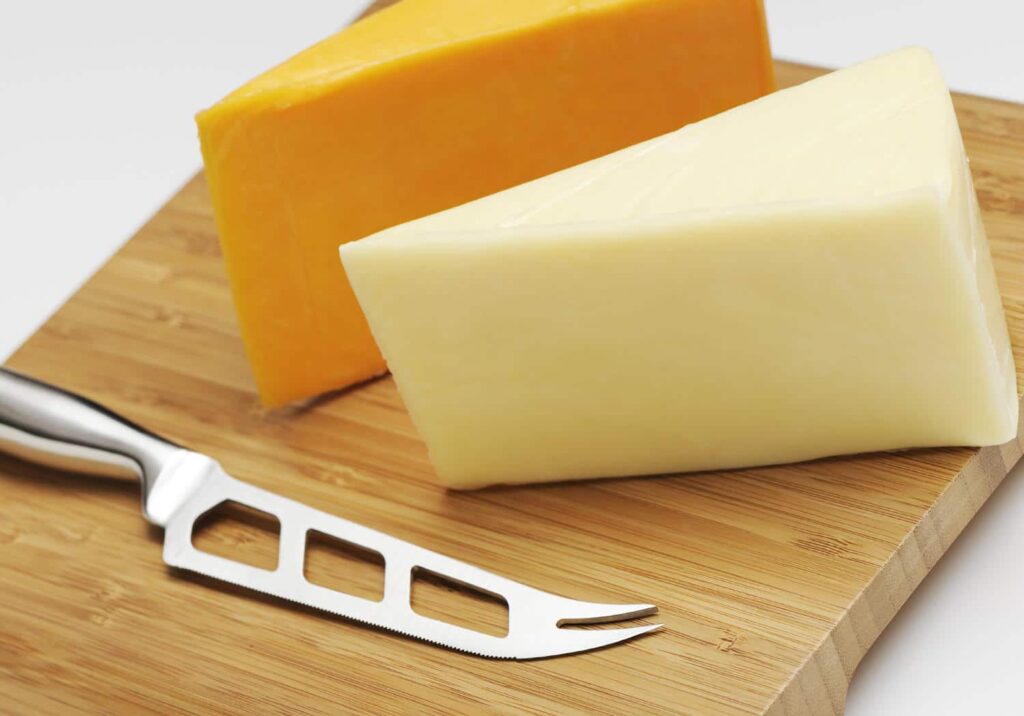
Full-fat cheese can also be a good choice for weight gain in dogs.
Cheese is high in both protein and fat, making it a great option to help your pup pack on some pounds.
In fact, experts warn against feeding your dog too much cheese because of its high-fat content as it can easily lead to obesity.
When done in moderation, your dog will put on just the right amount of weight.
Cheese also has lactose, even though not as much as whole milk.
Even so, do not feed cheese to a dog that has lactose intolerance as that can lead to health complications.
4. Peanut Butter

In moderation, peanut butter can be a tasty treat for dogs and a good source of healthy fats.
Look for unsalted versions to avoid any potential issues with sodium.
Keep in mind that some dogs may have allergies to peanuts, so check with your vet before introducing this treat into their diet.
Additionally, avoid any peanut butter that has xylitol, which is usually used as a sweetener in processed foods.
According to the FDA, this ingredient can result in xylitol poisoning in dogs.
You may also want to check: How Much Peanut Butter Can A Dog Have?
5. Turkey
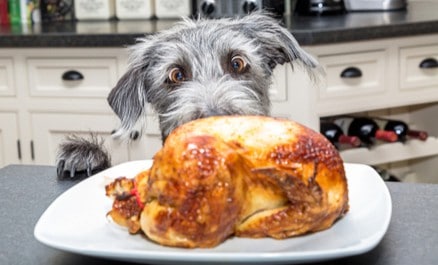
Turkey is used in lots of dog food recipes and is therefore safe for your pup.
It is not only rich in protein but also has some other beneficial nutrients like riboflavin, and phosphorous.
However, it has to be cooked differently from the way it is prepared for humans.
Cook the turkey plain without adding seasonings or fat and it should be safe for your dog.
Additionally, do not feed the fatty skin to the dog because it might cause some stomach upsets.
6. Chicken
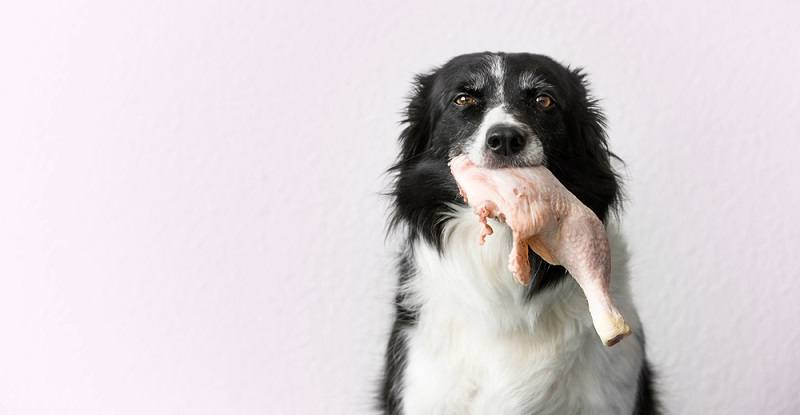
Like turkey, plain cooked chicken (without the skin) can be a good source of protein for weight gain in dogs.
Chicken is also commonly used as a dog food ingredient.
Avoid feeding them raw or undercooked chicken, as it may contain harmful bacteria.
The chicken can be poached, roasted, baked, or grilled and you can serve it individually or add it to your dog’s regular food.
Before serving chicken to your dog, you may want to find out if they are allergic because some dogs are allergic to chicken.
It is among the top 10 food items that dogs are allergic to.
Also, be sure to debone the chicken before serving. This is because the cooked chicken bones splinter easily and can be a choking hazard.
7. Fruit and Vegetables
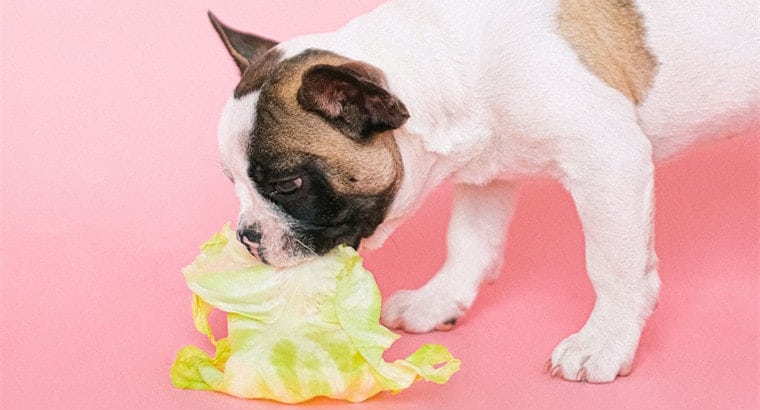
In addition to protein and fat, adding some low-calorie fruits and vegetables to your dog’s diet can also help them healthily gain weight.
Some good options include sweet potatoes, pumpkin, broccoli, carrots, apples, blueberries, and bananas.
These can be mixed into their regular food or given as a tasty treat.
Always avoid feeding your dog grapes, raisins, or any fruit with pits as these can be toxic to them.
Also, remember to cut any fruits or meats into small, bite-sized pieces before feeding them to your dog.
And always stick to plain, unsweetened varieties without added salts or sugars.
8. Plain, Unsweetened Yogurt
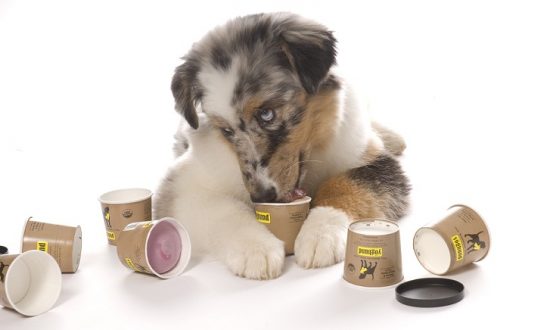
Full-fat plain yogurt can be a good source of protein and healthy fats for weight gain in dogs.
Avoid flavored or sweetened varieties, as the added sugar is not good for them.
Some dogs may also be lactose intolerant, so check with your vet before introducing yogurt into their diet.
Additionally, most dogs might struggle to digest lactose and so you shouldn’t be too liberal with the yogurt—just a little of it mixed in their food should do the trick.
You may want to keep an eye on your dog for signs of indigestion.
If you notice such signs, discontinue the yogurt immediately.
Otherwise, when done in moderation, yogurt can be safe and also help your dog gain weight first.
Related Post: How Much Yogurt Should You Give a Dog With Diarrhea?
9. Rice
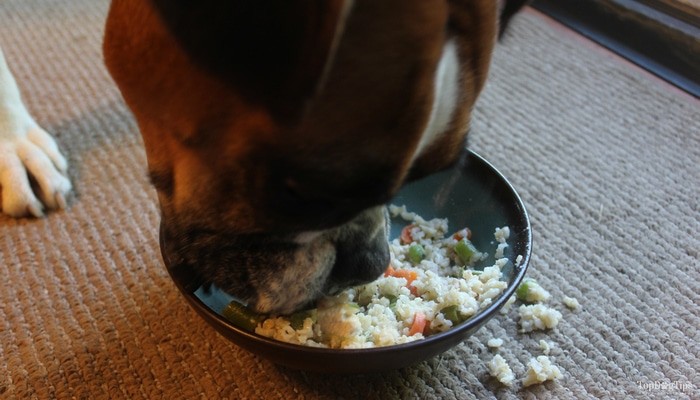
Rice is rich in carbohydrates and can certainly contribute to weight gain in your dog when included in its meals.
It is also likely to aid in easy digestion and can be quickly prepared.
Brown rice is generally not recommended for dogs due to its challenging digestibility.
White rice is safer but it’s essential to note that white rice can lead to increased blood sugar levels. So, feed it sparingly if your dog has diabetes.
Here are a few rice-related posts you may want to check out:
How Long Should I Keep My Dog On Chicken And Rice?
How Much Rice Should You Feed A Dog With Diarrhea?
10. Coconut oil
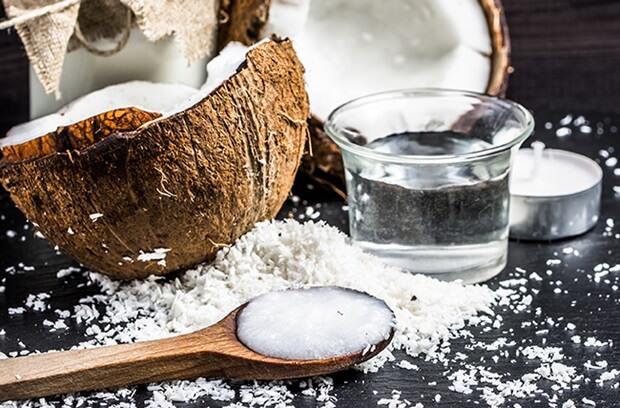
Coconut oil has potent antibacterial, antiviral, and anti-fungal properties.
If you’re seeking a natural human food to supplement your dog’s weight gain, coconut oil is an excellent choice.
Rich in beneficial saturated fats, coconut oil can also enhance your dog’s immune system, improve cognitive function, and alleviate itchy skin.
However, it is calorie-dense (up to 120 calories per teaspoon), so ensure you provide it to your dog in moderation to prevent excessive weight gain.
Also, consider gradually introducing the oil into your dog’s diet until his body adjusts to the change. This approach helps you monitor for potential allergic reactions.
11. Salmon, Tuna, Ocean Whitefish, and Herring
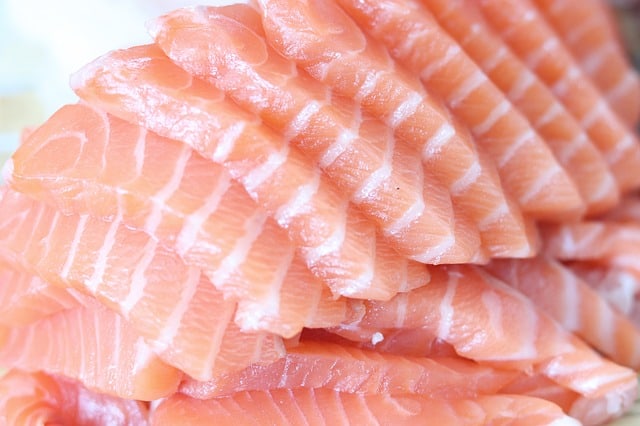
These fish are excellent sources of high-quality protein, making them excellent supplements for your dog’s weight gain.
They are also rich in omega-3 fatty acids, renowned for promoting joint health, cognitive function, and lustrous coats.
These fish also possess shorter lifespans, resulting in lower mercury levels.
Whichever fish you choose to feed your dog, ensure that it’s cooked and deboned, as uncooked versions may contain parasites.
Also read: Is Tuna Good for Dogs with Kidney Disease?
12. Sweet Potatoes and Pumpkin
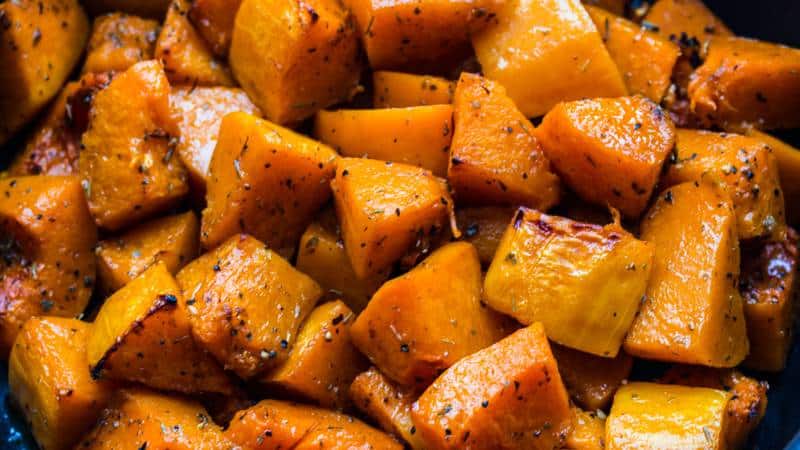
If you are looking to enhance your dog’s weight without introducing excessive protein, you can consider incorporating sweet potato and pumpkin into their meals.
Both are rich in fat and fiber, and can contribute to both better digestion and weight gain in dogs.
Both pumpkin and sweet potatoes are also rich in vitamins such as vitamin A that can help boost your dog’s immunity.
But you should remember a few caveats though if you decide to give your dog sweet potatoes and pumpkin to help him gain weight:
- Monitor him closely during the initial days of introducing these additions to his diet to ensure his bowel movements remain regular.
- Sweet potatoes should not make up more than ten percent of your dog’s diet. Although it offers vitamin A and fiber benefits, it also contains sugar. Overconsumption of sugar can lead to problems like obesity and diabetes, so moderation is essential.
Feel free to explore the following posts to learn more about the best practices for preparing pumpkins and sweet potatoes for your dogs.
How to Cook Sweet Potato for Dogs
How Much Pumpkin Should You Give a Dog For Constipation?
13. Quinoa
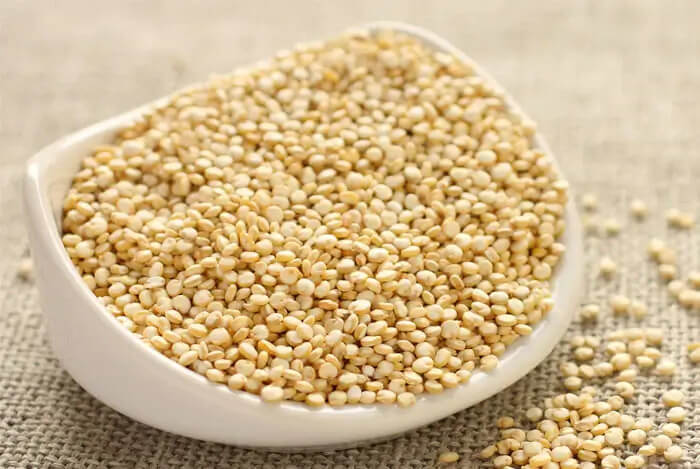
Quinoa is another excellent human food that can help your pup gain weight.
It offers valuable energy to help your dog gain weight and is among the few carbohydrate sources that are known to contain all the necessary amino acids essential for promoting muscle growth in dogs.
Quinoa is a staple in a variety of quality dry dog foods, so incorporating it into your dog’s diet on a regular basis will not result in any negative health consequences.
Instead, it offers a healthy alternative to starchy foods such as soy and corn.
Learn more about the benefits of quinoa here: Is Quinoa Good for Dogs?
14. Satin Balls
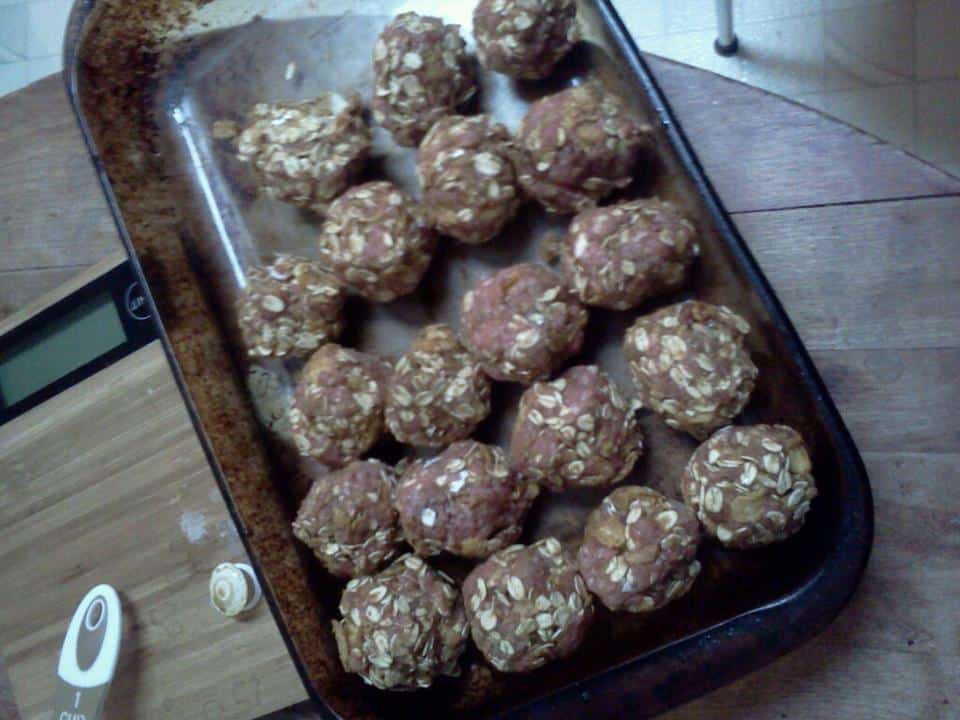
Satin balls are raw meatballs designed to help dogs gain weight quickly.
They are packed with carbohydrates, fats, fiber, and proteins.
If your dog requires some extra pounds, these homemade dog weight gainers can be a reliable option.
However, it’s important to note that satin balls are not suitable for puppies or pregnant dogs; they are intended for adult dogs.
I recommend starting with one satin ball for every 20 pounds of the dog’s body weight per day.
If you don’t see noticeable weight gain within the initial 5-7 days, consider increasing the daily intake of Satin Balls.
Learn more here: How Many Satin Balls Should You Feed Your Dog?
15. Bone Broth
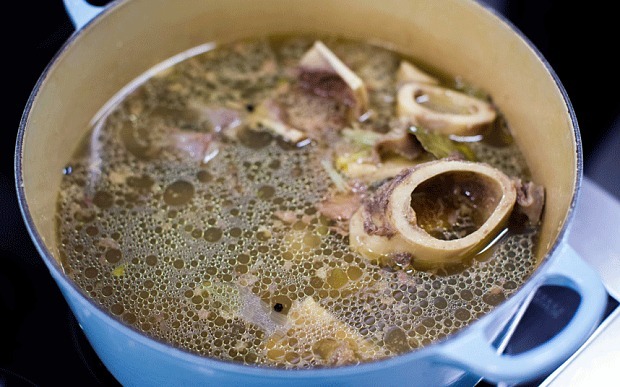
Bones and connective tissues are rich in a wide range of nutrients, including protein, fat, and various essential micronutrients like iron, calcium, potassium, and other minerals.
All these not only contribute to the overall health of your dog but also aid in reducing inflammation and preventing chronic diseases.
It’s clear, therefore, that incorporating bone broth into your dog’s diet can be a valuable strategy to boost their weight.
While purchasing bones, cartilage, ligaments, and tendons from a butcher may be cost-effective, the process of simmering these ingredients to create bone broth demands considerable time and effort.
Fortunately, there are convenient alternatives available for pet owners who are unable to dedicate their time to simmering bones.
Check this post for the readily available bone brought options for your dog: 9 Best Store-Bought Bone Broth for Dogs (plus Easy Homemade Recipes)
16. Pork
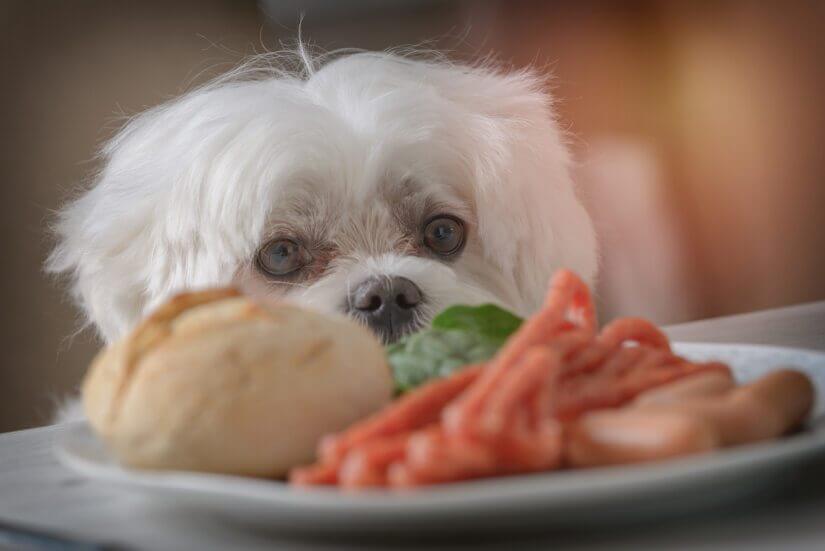
Pork is another human food option to consider for helping your dog gain weight.
Its tenderness and delicious flavor make it appealing to both humans and dogs.
However, it’s crucial to ensure that the pork you provide to your dog is thoroughly cooked to prevent any potential harm from the bacteria that can be present in raw pork.
Also, refrain from adding spices or seasonings to the pork intended for your dog’s consumption as they can be harmful to dogs.
You should also avoid feeding your dog processed pork products like bacon and ham due to their high sodium content, which can be detrimental to your dog’s health.
You may also want to check: Can Dogs Eat Scrapple?
Important Factors to Consider Before Feeding Your Dog Human Food for Weight Gain
A. Seek Advice from Your Veterinarian
Before you opt for human foods to aid in your dog’s weight gain, it’s crucial to have a discussion with your veterinarian.
Engage your vet in a conversation about your dog’s weight to ensure that you’re making informed decisions and not jeopardizing your dog’s well-being.
If possible, request a comprehensive physical examination, as several diseases or health issues might be influencing your dog’s weight loss or reduced appetite.
Addressing these potential factors is essential prior to initiating a weight gain program.
Your veterinarian can also provide valuable insights into suitable human foods for your dog and recommend a suitable target weight—all of which will assist you in achieving weight gain milestones for your dog safely.
B. Proceed with Caution
An abrupt increase in weight can strain a dog’s joints due to the added pressure.
So, whatever human food you decide to give your dog, ensure safety by embracing a gradual feeding routine that places the dog’s overall well-being as the top priority.
As you commence this journey, establish modest objectives for your dog. These goals could involve gaining as little as half a pound at a time.
Employing incremental progress will enable your dog to put on weight steadily while minimizing the risk of potential health complications.
C. Include Physical Activity
While it might appear counterintuitive to suggest exercise for a dog in need of weight gain—considering that exercise burns calories—there are benefits to incorporating physical activity in your weight gain plan .
Exercise aids your dog in building muscle mass and adding bulk to their physique.
Increased physical activity can also boost your dog’s appetite.
However, it’s important to strike a balance, as insufficient exercise alongside weight gain efforts could lead to obesity.
So, just as you gradually adjust your dog’s diet, implement exercise increases progressively.
Engage your furry companion in both mental and physical games to keep them occupied throughout the day while ensuring their fitness.
Regular exercise is vital—ideally twice a day.
If your dog isn’t accustomed to regular exercise, consult your veterinarian for guidance on safe amounts of walking, running, and jumping, then gradually ramp up the intensity and duration of these activities.
Finally, during hot weather, remember to provide your dog with ample water and allow him sufficient recovery time between exercise sessions.
Parting Thoughts
When done in moderation and with caution, incorporating some human foods into your dog’s diet can help them gain weight.
Good options include beef, eggs, turkey, peanut butter, cheese, chicken, fruits & vegetables, plain yogurt, quinoa, rice, coconut oil, bone broth, satin balls, salmon, pork, sweet potato, and pumpkin.
Remember that your dog’s main source of nutrition should still come from a balanced dog food diet.
And while these human foods can be safe options for your dog to gain weight, it’s important to remember that they should still primarily be fed a balanced diet made specifically for dogs.
The best plan for your pup will also vary depending on their individual needs and health concerns.
It is therefore a good idea to consult with your vet before making any changes to your dog’s diet, especially regarding incorporating human foods as occasional treats or mix-ins.
Related Posts:
As an Amazon Associate, we may receive a small commission from qualifying purchases but at no extra cost to you. Learn more. Amazon and the Amazon logo are trademarks of Amazon.com, Inc, or its affiliates.

